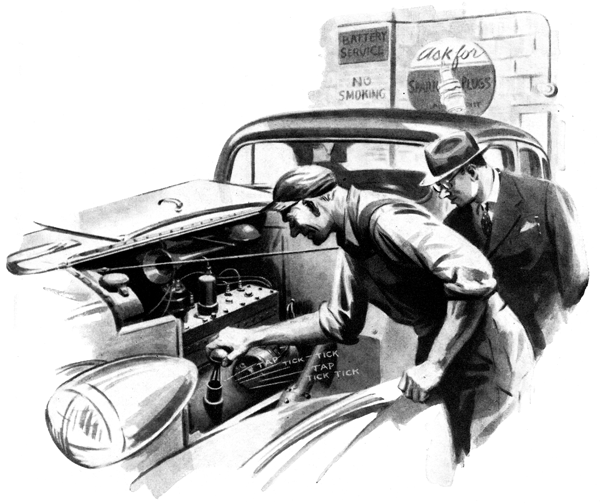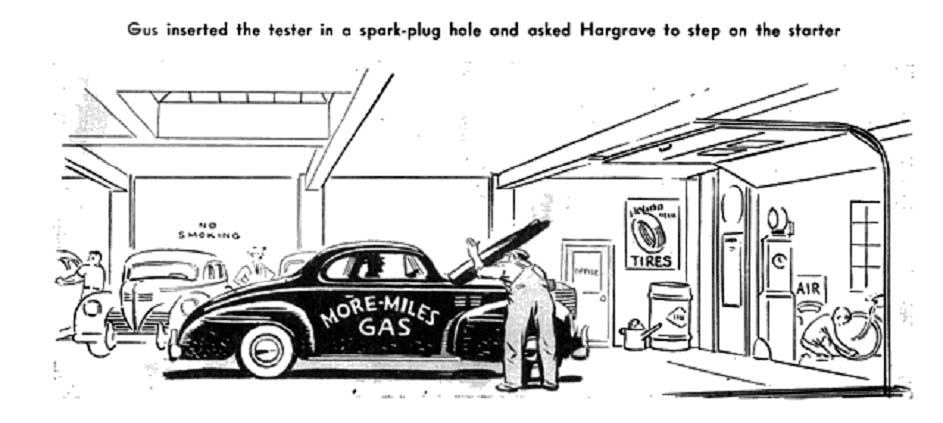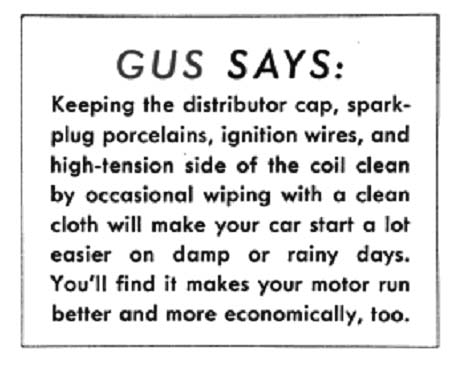August 1940
GUS KEEPS A SECRET
by Martin Bunn
A good car doctor, like an M.D., never discusses his patient's troubles.

"My name's Pond, and I'm a peculiar sort of a cuss about noises," explained the little man who just had driven a well-kept sedan into the Model Garage shop. "I can't stand them. Specially noises in a car. This one's driving me nuts!"
Gus Wilson cocked his head and listened to the hum of the idling engine. Its smooth purr told him that it was a good engine which had been given good care. "Sounds fine to me," he said.
"Yes, it sounds fine -- now!" Pond agreed. "But just wait! It runs for five or six minutes the way it's supposed to run and then I hear that blamed noise. Listen!"
Gus listened. For another minute the engine continues its smooth hum. Then he heard it -- tap -- tick-tick" tap -- tick-tick; a faint tapping and ticking sound that few drivers would have noticed.
"Yes, there's a noise -- an unusual sort of noise," Gus said. "How long have you been hearing it?"
"Since yesterday," Pond told him. "Yesterday morning, down in the city, I took the car into one of those fancy service stations to have a little electrical job done on it. You know the sort of a place I mean -- where a fellow in a white coat glad-hands you when you drive in, writes down what you tell him is the matter with your car on a form, and then hands the job over to some guy who doesn't do anything but brakes or transmission or something. Well, soon as I drove out, I heard that tap-ticking for the first time. It sounded as though it was in the distributor shaft. I drove right back in again and told the fellow in the white coat about it. He called out the mechanic who had done my job, and after they had listened and palavered about it they took the generator and distributor off and checked them. They seemed to be O.K., so they put them back on, and when they started up the motor the noise was gone. So I drove out -- and, by golly, I hadn't gone a block when the tap-ticking started again! I didn't have the time to go back again, but I've been hearing that noise on and off ever since then, and I want whatever's making it fixed!"
Gus listened again. "It does sound as if it is in the distributor," he agreed, "but I'll make certain."
He got a two-foot length of quarter-inch steel rod from the shelf over his work bench, bent his thumb over its upper end, pressed his ear firmly against his thumb, and listened intently as he brought the rod lower and into contact with various parts of the engine. "No," he decided after a minute or so, "the noise isn't in the distributor. It's in the crankcase -- but the funny thing about it is that it moves around in the crankcase."
He stood thinking for a couple of minutes. Then he took the breather cap off the oil filter pipe, and spent a couple more minutes listening intently at the opening.
Presently he called Harry, the grease monkey, and told him to drain the oil and let down the crankcase. He went over to his bench again and struck up an argument with his customer on the advantages of fresh-water fishing over the deep-sea variety. It was not Gus's habit to argue with a customer, but Joe Clark, his partner, had prevailed on Gus to take the coming week-end off for a go at his favorite pastime -- outside the Model Garage -- fishing. And, to put it mildly, Gus was feeling "set up" already. Besides, Pond looked as if he loved an argument, and Gus knew more good than harm would come of it.
At a word from Harry, who had completed the task of letting down the crankcase in what Gus figured was roughly twice the time it would have taken him to do it himself, the two men broke off their friendly tiff and approached the problem of the car again.
Let's look in that thing," Gus said, kneeling over the greasy pan "What's this?"
His keen eye spotted a dark round object nestled up against a baffle plate of the case, and he picked it up. It was a half-inch, hexagonal nut.
"There's your tap-ticker!" Gus said. "I suppose that while that mechanic was working on your car yesterday he accidentally dropped the nut down the breather pipe. Since then it has been washing around in the oil, and every once in a while the crank-shaft would hit it and knock it against the side of the oil pan, high up -- that's what made the noise that bothered you every few minutes. No harm done -- as soon as Harry replaces your crankcase and refills it you'll be ready to roll."
"There are some smart mechanics left!" Pond remarked. "Well, you've made me a steady customer of yours -- for a long time I've been looking for a fellow like you and a shop like this!"
Gene Hargrave, who is a big-money sales promotion man for More-Miles gasoline and oil, and an old friend of Gus Wilson's drove his classy coupe into the shop an hour or so after the highly-satisfied Pond had driven out. "Hello, Gus," he greeted. "How good are you at keeping a secret?"
"What's the gag?" Gus wanted to know, not quite sure his friend was serious.
"No gag at all," Hargrave assured him. "I'm on a spot. I've got to have a job done on this bus, and I can't afford to let anyone in the business know that I'm having it done."
"Deep stuff, hey?" Gus said, grinning. "All right, Gene -- I'll keep mum about it. What's the mystery Job?"
Hargrave got out of his car, snatched a fill of Gus's tobacco, perched himself on the end of the work bench and lighted his pipe.
"Here's the layout," he explained. "Naturally, I use More-Miles gas and the best grade of More-Miles oil in my car. Equally naturally, I do everything that I can to get the best performance possible out of the products I sell -- keep my engine in the very best condition, change my oil every thousand miles, and so on. That's good business for me. I can talk about the big mileage I get out of More-Miles gas in my car, and the smooth running of my engine is a grand advertisement for our oil.
"Now I'm going to tell you something that I don't want anyone else to know, Gus.
Although my car is only a year old, the piston rings are very badly worn. I'm sure that it isn't the fault of our oil, but lots of people would think that it is. I want you to order a new set of rings and slip them in sometime when there's no one around who'll ask questions about whose car it is. Get me?"
"Yes, I've got you," Gus said. "But what makes you so all-fired certain that your rings have gone bad?"
"It couldn't be anything else," Hargrave asserted. "I've got too much oil -- every time I change it I take out a quart or so more than I put in the last time I changed it. I've checked on everything. The dilution isn't caused by water from the cooling system leaking in -- I never have to add a drop to what's in the radiator. There's nothing the matter with the carburetor choke -- it doesn't stick in the choked position. It must be the rings -- they've worn so badly that the gas leaks past them and the pistons into the crankcase. I'm dead certain of it!
"You can see why I'm on a spot. The condition of my engine after only a year of running doesn't make More-Miles look like as good an oil as it is, and it would hurt the sale of More-Miles products in this district if the story about those bad rings got out -- to say nothing about the kidding and roaring I'd have to stand for!"
"The story won't get out of this shop." Gus said. "I'll get your car fixed up as quickly as I can. But maybe you're wrong about those rings, Gene. Better let me check over your engine before I start tearing it apart."
"Go ahead and check it," Hargrave told him. "But I'm right about the rings."
Gus got his vacuum tester out and soon reported that the manifold pressure was normal. Then he connected the compression tester to each spark plug hole as Hargrave stepped on the starter. "There's nothing the matter with those rings, I tell you!" Gus said.
"Well, then," Hargrave demanded, "where does that dilution of the oil come from?"
"That's what we've got to find out," Gus said. He took the carburetor off and examined it. "That's O.K.," he decided. "I'll have to look at the fuel pump." He removed it from the engine, and washed it off with gasoline. Then he whistled. "What's this?" he asked, pointing to a small patch of solder.
"Oh, I did that little job myself," Hargrave said, "I noticed gasoline leaking out of a small hole, so I soldered it shut -- even a little gas leak means less mileage."
Gus laughed as he drove the solder out of the hole with a small punch. "You are a wise guy, Gene," he said between chuckles. "That hole you soldered up so carefully is a telltale -- one of its purposes is to give warning, by gasoline leaking out of it, that the pump's diaphragm is broken or leaking. That's why your oil is diluted -- gasoline has been leaking through the diaphragm into the crankcase. Those piston rings haven't anything to do with it."
"Huh?" muttered Hargrave. Then he saw the light, and did some fancy cussing.
"I am a sap!" he confessed after a while. "Put in a new diaphragm, will you, Gus?
And, say -- if this story every gets around -- "
"I told you," Gus reminded him, "that I can keep a secret. I can -- and I will!"
END
L. Osbone 2019

